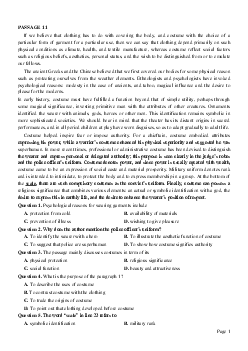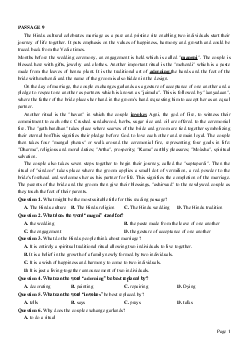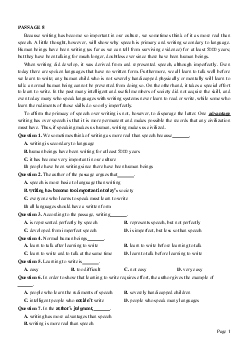

Preview text:
PASSAGE 25
Former technology industry leaders are calling for urgent measures to protect children from smart phone
addiction. Among those urging major changes is Tristan Harris – a former high-level employee at Google.
He just launched a group that will seek to gather and publish evidence of how digital devices and social
media can harm children and young people. Basing on the findings of this study, Tristan Harris says
Apple and other technology companies need to actually change their current engineering and design
methods to be more kid friendly.
Common Sense Media is partnering with the Centre for Humane Technology on a new campaign aimed
at getting companies to make such changes. The effort includes a major public information campaign that
will target schools, where research has also shown that mobile devices can hurt the learning process
James Steyer is the founder of Common Sense. He says more than half of schools in the U.S. are already
members of the organization. The group provides teachers and parents with learning materials intended to
help students develop critical thinking skills and balance their digital lives.
Steyer says Common Sense will be providing even more resources to educators beginning in the new
school year next fall. “And you know what’s going to be in there? Stuff about addiction, how to prevent
digital addiction. Stuff about digital manipulation. I actually think if you tell kids how they’re being
manipulated, it will change their relationship with technology.”
Most education experts believe technology will remain in schools far into the future. Steyer says the big
question is how this ever-changing technology will be used in schools going forward. “And are we going
to educate the teachers, the students and their parents about the thoughtful, ethical use of those platforms
and the software? That’s the whole challenge ahead of us.”
Question 1. Who used to work for Google? A. Tritan Harris
B. The Founder of Common Sense C. James Steyer
D. The manager of the Centre for Humane Technology
Question 2. What does the word “their” in the first paragraph refer to? A. The findings
B. Technology companies C. Design methods D. Kids
Question 3. What is most likely to distract students from studying? A. A smartphone B. An intelligent dog C. A home computer D. A newspaper
Question 4. How many per cent of schools in the U.S. are members of Common Sense Media? A. 25% B. 33% C. 50% D. 75%
Question 5. What skills are needed to protect children from smart phone addiction?
A. Problem solving skills
B. Communication skills
C. Critical thinking skills
D. Time management skills
Question 6. Schools will receive further materials on technology addiction next . A. spring B. summer C. autumn D. winter
Question 7. What is NOT mentioned by Steyer as topics of materials for schools? A. Addiction
B. Addiction prevention C. Time management
D. Digital manipulation Page 1
Question 8. According to Steyer, it’s
to educate people to use digital products smartly A. time-consuming B. expensive C. unnecessary D. difficult ĐÁP ÁN 1-A 2-B 3-A 4-C 5-C 6-C 7-C 8-D Page 2




